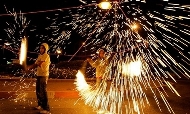HEBRON, West Bank, Oct 27 (Reuters) - At a shoe store in downtown Tel Aviv, several fashion-conscious customers are buying the latest line of men's shoes, designed and manufactured by the Back Fire Company.
"Shoes from another world" is the logo sported by the company's slick website. And so they are.
Down a dusty alley in the West Bank city of Hebron, a metallic rumble punctuates the chatter of schoolchildren as they clamber over a stone Israeli roadblock. The sound is loud in the alley but the youngsters do not look back even once. They have well-tuned ears: the Back Fire Company's gantry is busy lowering another load of boxes for delivery to markets in Israel, the West Bank and overseas.
Hebron, under almost continuous Israeli military control since April, was one of the economic powerhouses of the Palestinian Territories.
Since the start of a Palestinian uprising for statehood two years ago and military clampdowns in the West Bank in response to suicide bombings in Israel, Hebron's industrial production has dived between 30 to 40 percent, local officials said. The shoe industry, one of the former bulwarks of the city's economy has shrunk by as much as 70 percent.
At the Back Fire factory, located in a large house set back from the alley, 40 workers seem as busy as ever, making award-winning leather shoes with leather and soles imported from Italy and Germany.
"We've managed to continue, despite the occupation, despite the closure, despite the curfews," said Ahmed Abu Deen, owner, designer and general manager of Back Fire shoes. Back Fire has satellite offices in Tel Aviv and in the West Bank city of Ramallah. Workers in four villages outside Hebron do all the stitching in a line of hand-made shoes, making for a total workforce of 92.
In March 2001, despite the uprising, Abu Deen won a prestigious Arch of Europe award in Frankfurt for technological initiative and production quality. The company's website, www.back-fire.net, proudly sports the award, as well as a picture of the company's headquarters in Hebron.
ANOTHER WORLD
On the website, as on the Back Fire shoe boxes, the company's name and logos are written in English and Hebrew. There is no mention of Hebron.
There is no sign of another world where stone and rock barriers block almost every street, where dust -- from roads churned to powder by Israeli armour -- chokes everything, no sign of the grime of two years of conflict.
Nor is there anything on the well-crafted website indicating how Israel's reoccupation of the Palestinian-controlled section of the city after suicide bombings killed 26 people in Jerusalem in June has affected the business.
Abu Deen said production at the company, which had an annual turnover of almost $3 million before the uprising, or Intifada, is down to 300 to 400 pairs of shoes a day, from 700 two years ago and way below the 1200 pairs a day planned for 2002. A new factory building is on hold and curfews that affect almost 80 percent of the 30 to 40 workers at the Hebron factory have eaten heavily into profits.
Abu Deen's problems pale by comparison with that of other shoe factories in Hebron where shoe manufacturing, for centuries a cottage craft, took off about 40 years ago.
To this day the city, divided into Israeli- and Palestinian-controlled sectors under a 1997 interim peace deal, even produces military boots for the Israeli army. About 10,000 workers greased the city's well-oiled industry before the Intifada; today as few as 3,000 are still employed. "The shoe industry in Hebron will never recover," said Abu Deen, who has seen a flood of shoes manufactured in southeast Asia fill the void left by curfew-hit factories in the city. Looking to the day when Israeli incursions and the Palestinian uprising end, Abu Deen hopes to see a stable government run the Palestinian Territories. Then, he said, he will have someone to turn to when other manufacturers steal his designs.
"Who can I turn to now?" he asked. "I cannot take them to court, there's no one to go to."





